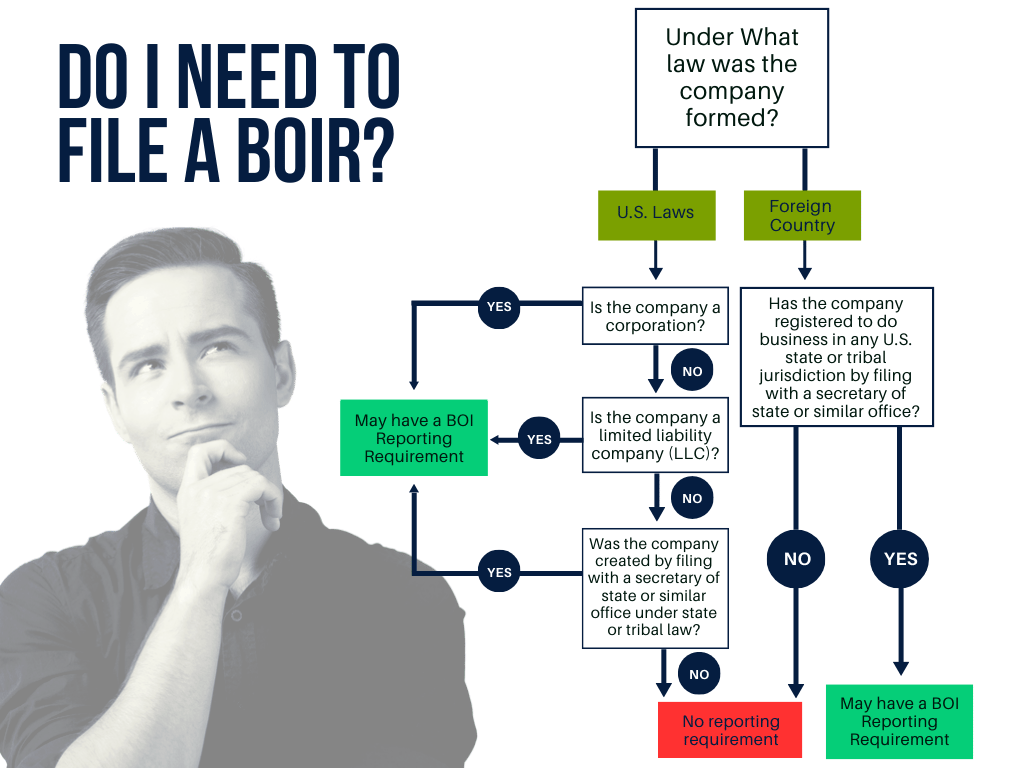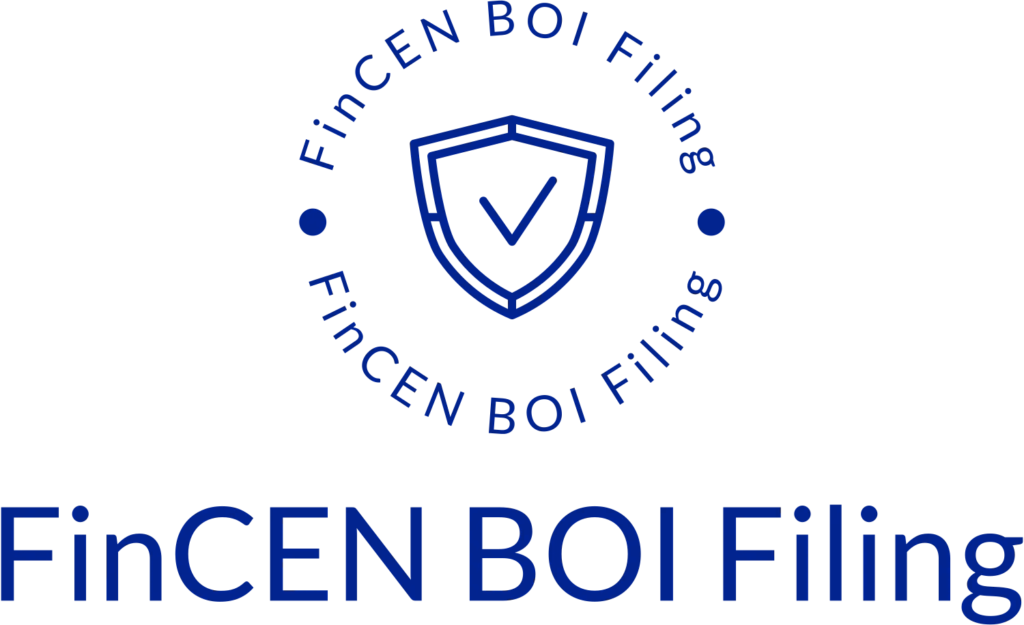What is the BOI report?
Top Questions Answered for Business Owners by: FinCENBOIFiling.com
Navigating the waters of Beneficial Ownership Information (BOI) reporting can seem daunting for many business owners. At FinCEN BOI Filing, we understand the challenges and are dedicated to providing a user-friendly, efficient solution to facilitate your BOI reporting process. In this article, we aim to answer the most common questions in a friendly, professional manner, ensuring you have a clear understanding of what’s expected.
What is BOI Reporting and Who Needs to Do It?
Beneficial Ownership Information (BOI) reporting is a regulatory requirement that mandates certain business entities to disclose information about their beneficial owners to the Financial Crimes Enforcement Network (FinCEN). The goal is to promote transparency and combat financial crimes such as money laundering, terrorist financing, and tax evasion by identifying the individuals who ultimately own or control the entity.
Who Needs to File the BOI Report? The requirement to file a BOI report applies to a broad range of business entities, including corporations, limited liability companies (LLCs), and other similar structures. Any company that meets the criteria set forth by the Corporate Transparency Act (CTA) must disclose its beneficial owners to the Financial Crimes Enforcement Network (FinCEN). Specifically, the CTA mandates that any individual who owns or controls at least 25% of the company’s equity or has significant influence over the entity must be reported.
Beyond just ownership, the requirement extends to individuals who have substantial control over the company’s activities, make significant decisions, or own a considerable stake. Compliance is crucial, as failure to submit accurate BOI reports can result in severe penalties, including substantial fines and legal repercussions.
Navigating Complex Ownership Structures
Determining whether a company needs to file beneficial ownership information can be complicated when ownership structures involve multiple layers or entities. Some scenarios that can make this determination challenging include:
Companies with multiple owners spread across different entities or trusts may not have a single individual meeting the 25% ownership threshold for reporting. However, if those owners work in concert, they could be considered to have significant control over the company, potentially triggering reporting requirements. Careful analysis of ownership stakes and decision-making authority is necessary in such cases.
Additionally, companies owned by other corporate entities, rather than individuals, can obscure the trail of beneficial ownership. If the parent company has a complex ownership structure involving other businesses or trusts, it may be difficult to identify the ultimate individual owners or controllers. Regulators may need to “pierce the corporate veil” by looking through multiple layers of ownership to determine if reporting is mandated.
Determining Your Company’s BOI Reporting Requirement
While the general rule is that most companies, including single-member LLCs, need to file a BOI report, the specifics of your company’s structure and ownership may affect this requirement. To help you determine if your company needs to file, we’ve created a flow chart that outlines the key decision points.

As illustrated in our flow chart, the filing requirement isn’t always straightforward, especially for companies with complex ownership structures. Companies with multiple owners spread across different entities or trusts may not have a single individual meeting the 25% ownership threshold for reporting. However, if those owners work in concert, they could be considered to have significant control over the company, potentially triggering reporting requirements. Careful analysis of ownership stakes and decision-making authority is necessary in such cases.
Additionally, companies owned by other corporate entities, rather than individuals, can obscure the trail of beneficial ownership. If the parent company has a complex ownership structure involving other businesses or trusts, it may be difficult to identify the ultimate individual owners or controllers. Regulators may need to “pierce the corporate veil” by looking through multiple layers of ownership to determine if reporting is mandated.
To find out quickly if you’re required to file a BOI report for your business, check out our free 2-minute Eligibility Quiz.
When are the BOI Reporting Deadlines?
- For Companies Established Before January 1, 2024: File your initial BOI report by January 1, 2025.
- For Companies Established Between January 1, 2024, and December 31, 2024: You have a 90-day window post-registration for filing.
- For Companies Established On or After January 1, 2025: The deadline is within 30 days of registration.
How Can I Prepare for BOI Reporting?
Preparing for BOI reporting involves understanding your obligations, gathering necessary information about your beneficial owners, and deciding your filing strategy. Staying informed with the latest guidelines is also key. You can prepare your BOI filing directly on our homepage.
To find out quickly if you must file a BOI report for your business, check out our free 2-minute Eligibility Quiz.
How Does FinCENBOIFiling.com Facilitate the BOI Reporting Process?
FinCEN BOI Filing has revolutionized the process of BOI reporting, catering to both individual filers and business service companies. Our platform offers a streamlined and user-friendly interface for individual filers, making it easy to submit BOI reports directly to FinCEN. This approach ensures compliance with minimal hassle, allowing users to input necessary details such as beneficial owners’ information securely and efficiently.
Moreover, FinCEN BOI Filing has empowered business service companies like attorneys and tax preparers by providing them with a white-labeled service. This service enables these professionals to embed our BOI filing form directly on their websites, offering a seamless experience for their clients. By leveraging our white-label solution, these firms can enhance their service offerings, maintain brand consistency, and earn revenue through BOI filing services.
What Are the Benefits of Using FinCENBOIFiling.com?
- Ease of Use: Our user-friendly questionnaire makes the BOI reporting process straightforward.
- Compliance Assurance: We ensure that your filings are compliant with current regulations.
- Time and Cost Efficiency: Our solution saves time and is offered at a reasonable price.
- Privacy & Security: We ensure confidentiality by securely transmitting reports to FinCEN via an approved API connection with their system.
How do I get started and file my FinCEN BOI report?
We simplify the process by offering you direct access to the online form right from our homepage at FinCENBOIFiling.com. Learn more about how we can streamline your reporting process, ensuring compliance without the stress.
BOI reporting is an essential aspect of modern business operations, albeit complex. With FinCENBOIFiling.com, you have a partner dedicated to simplifying this process, providing a cost-effective, user-friendly solution. Let us help you navigate BOI reporting, keeping your business compliant and informed.
Frequently Asked Questions
Have questions about the Beneficial Ownership Filing process? Check out FinCEN BOI Filing's frequently asked questions for the answer.
What is a BOI report?
A Beneficial Ownership Information (BOI) report is a filing required by FinCEN to disclose key details about individuals who own or control a company, ensuring compliance with anti-money laundering laws and enhancing corporate transparency. Filing a BOI takes 5-10 minutes and can be done here.
When does the CTA become effective?
The Corporate Transparency Act (CTA) reporting requirements take effect on January 1, 2024. Business entities established before this date have until January 1, 2025, to meet the reporting obligations.
Are there penalties for not filing a BOI report?
Yes, failing to file a BOI report can result in substantial penalties, including hefty fines and potential legal repercussions. Learn more about the BOI deadlines and non-filing BOI penalties.
How do I file a BOI report?
Filing a BOI takes about 5-10 minutes and can be done here. If you’re not sure if you are required to file, you can take the one minute BOI Eligibility Quiz.
Who is considered a beneficial owner?
A beneficial owner is any individual who either:
- Directly or indirectly exercises substantial control over the reporting company, or
- Directly or indirectly owns or controls 25% or more of the company’s ownership interests.
Substantial control includes the power to direct, influence, or determine significant decisions of the company. This may involve senior officers or individuals with authority to appoint or remove senior officers or a majority of the board.
Ownership interests encompass rights that establish ownership in the company, ranging from basic stock shares to more complex financial instruments.
For more details on “substantial control” and “ownership interests,” refer to our guide on complex ownership structures.
How do BOI reports get submitted to FinCEN?
We submit reports through a secure API connection directly with FinCEN’s Beneficial Ownership Secure System (BOSS). This integration allows for seamless and efficient filing of Beneficial Ownership Information reports, reducing the time it takes to complete and submit a report.
Our user-friendly form is designed to minimize errors by guiding you through the process with clear prompts and checks. Additionally, by using the secure API connection, we ensure that your data remains private and protected throughout the submission process, adhering to the highest security standards.
Who can access the beneficial ownership information?
The beneficial ownership information will be accessible only to authorized government agencies, such as law enforcement and regulatory authorities, for the purpose of combating money laundering, fraud, and other financial crimes.
This data is not publicly available and is used solely for compliance with legal and regulatory requirements. Only those with a legitimate need, as defined by the law, will be able to access this information to ensure transparency and uphold national security.
You can read more about keeping your personal information private when filing your BOIR.
Do I need to file a BOIR annually?
No, you do not need to file a Beneficial Ownership Information Report (BOIR) annually. However, you are required to update and file a new report if there are any changes to the beneficial ownership or company applicant information, such as changes in ownership or control. The report must be filed when there are material updates, but there is no annual filing requirement unless changes occur.
What information is required in a BOI report?
Type of Report
The reporting company must specify the type of report being submitted: an initial report, a correction of a prior report, or an update to a prior report.
Company Information
The reporting company must provide the following details:
- Legal Name: The official name of the company.
- Trade Name: Any “doing business as” (DBA) names used by the company.
- Address: The current street address of its principal place of business. If the principal place of business is outside the U.S., the company must report the address from which it conducts business in the U.S.
- Taxpayer Identification Number (TIN): This includes an EIN, SSN, or ITIN, as appropriate.
Beneficial Owner Information
The reporting company must provide the following details for each beneficial owner:
- Legal Name: The individual’s full legal name.
- Date of Birth: The individual’s date of birth.
- Address: The individual’s residential street address.
- Identification Document: A unique identifying number from an acceptable identification document, the issuing state or jurisdiction, and an image of the document.
Company Applicant Information (if required)
For reporting companies created on or after January 1, 2024, the following information about the company applicant must be provided:
- Address: The individual’s residential street address. If the applicant forms or registers companies as part of their business (e.g., paralegals), the business address can be used. The address does not need to be in the U.S.
- Identification Document: A unique identifying number from an acceptable identification document, the issuing state or jurisdiction, and an image of the document.
Who needs to file a BOI report?
Most businesses are required to file a BOI report, with exceptions for 23 specific categories, such as publicly traded companies and other regulated entities. To learn more about these exemptions and determine if your business needs to file, read this article.
When is the BOI report due?
- Companies formed or registered before January 1, 2024, must file an initial BOI report by January 1, 2025.
- Companies formed or registered in 2024 must file a BOI report within 90 days of receiving actual or public notice of their formation or registration.
- Companies formed or registered on or after January 1, 2025, must file their initial BOI report within 30 days of receiving actual or public notice.
You can learn more about the BOI deadlines here.
What is type of ID is required?
Acceptable identification documents include the following:
- A valid, unexpired driver’s license issued by a U.S. state or territory.
- A valid, unexpired ID card issued by a U.S. state, local government, or Indian Tribe for identification purposes.
- A valid, unexpired passport issued by the U.S. government.
- If none of the above is available, a valid, unexpired passport issued by a foreign government may be used instead.
An identification document must be collected for each beneficial owner.
For companies formed after 2023, an ID must also be provided for the company applicant.
Who is a company applicant?
A company applicant is the individual responsible for creating or registering a company. Specifically, it includes:
- The individual who directly files the document to form or register the entity with the relevant state or tribal authority, such as the Secretary of State.
- The individual primarily responsible for directing or controlling the filing process, even if they are not the one submitting it.
For companies formed or registered after January 1, 2024, this information must be reported as part of the Beneficial Ownership Information Report (BOIR).
Is it necessary to use a certified public accountant (CPA) or other professional to submit a BOI report?
Most individuals will be able to submit their Beneficial Ownership Information reports directly without needing assistance from attorneys or CPAs. Our streamlined, user-friendly form guides you through the process, making it simple to provide the required information accurately and efficiently.
Is a company required to update and correct information that is no longer accurate?
Yes, a company is required to update or correct its beneficial ownership information whenever it is no longer accurate. If there are any changes to the company’s beneficial owners or company applicant information, such as a change in ownership percentages or control, the company must file an updated report with the correct details. This ensures that the information on record remains accurate and compliant with the reporting requirements, helping to maintain transparency and reduce the risk of misuse.
Will I receive a confirmation of submission after submitting the BOIR?
After submitting your BOIR through our website, you will receive an email containing a unique submission process ID, confirming that your submission has been successfully received.
The email will also notify you once FinCEN has accepted your report. In rare instances, if your submission is rejected, we will inform you of the reason and provide a link to resubmit the corrected information.
You can track the status of all your submissions through our BOIR tracking page, ensuring you stay updated on the progress of your report. Most submission have a confirmed acceptance within a few minutes of submission.

